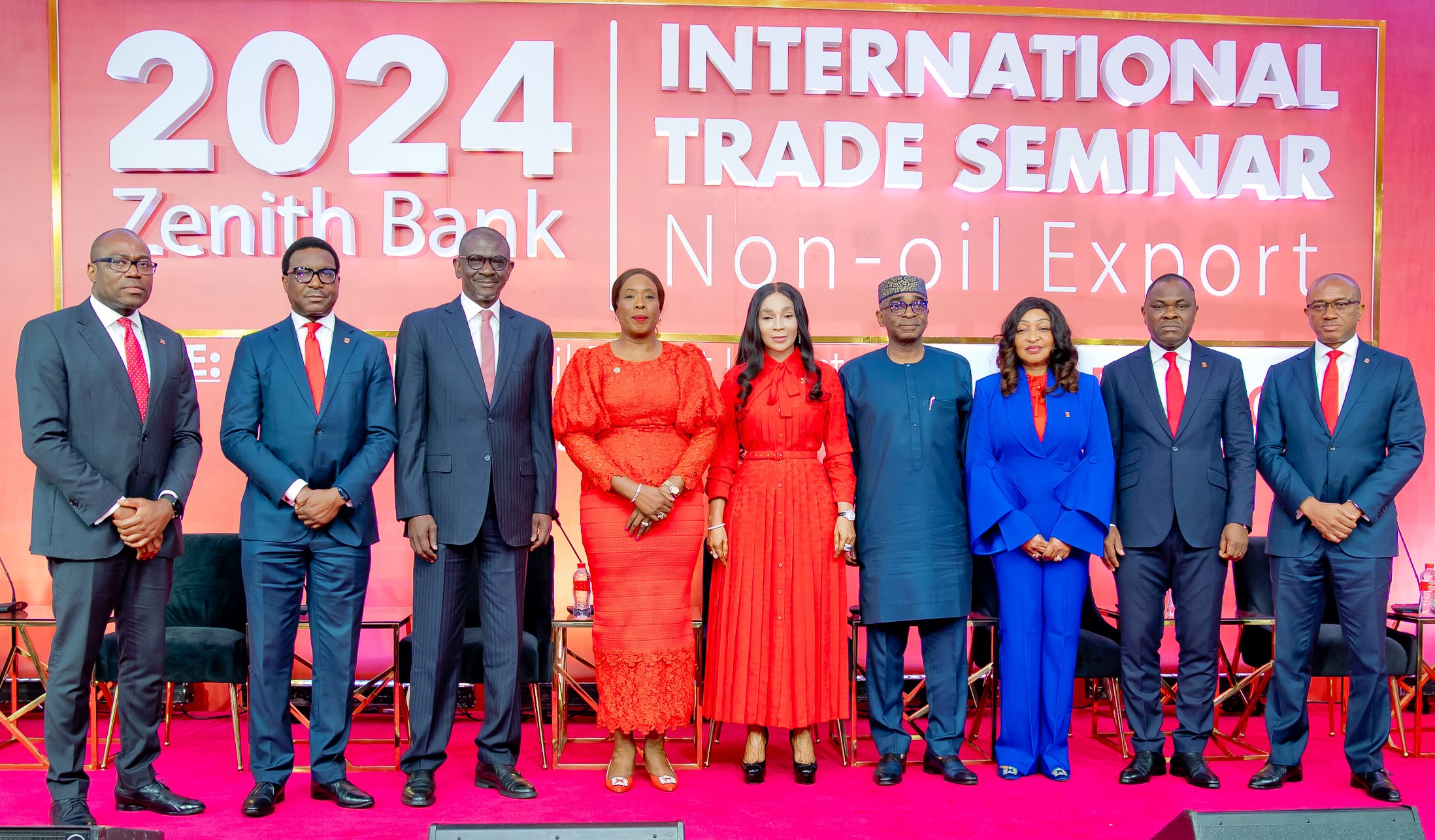Business
STAKEHOLDERS ADVOCATE INCREASED INVESTMENT IN NON-OIL EXPORT PRODUCTS AS A PANACEA FOR ECONOMIC DIVERSIFICATION AT THE 2024 ZENITH BANK INTERNATIONAL TRADE SEMINAR

STAKEHOLDERS ADVOCATE INCREASED INVESTMENT IN NON-OIL EXPORT PRODUCTS AS A PANACEA FOR ECONOMIC DIVERSIFICATION AT THE 2024 ZENITH BANK INTERNATIONAL TRADE SEMINAR
Stakeholders unanimously called for concerted efforts towards adding value to non-oil export products by processing them into semi-finished and finished goods in order to unlock significant economic benefits for the nation. This clarion call was made at the 9th Edition of the Annual Zenith Bank International Trade Seminar themed “Nigerian Non-Oil Export Industry: Awakening the Giant”, which was held on Wednesday, September 4, 2024, at the Civic Centre, Victoria Island, Lagos and virtually.
In her welcome address, the Group Managing Director/Chief Executive Officer of Zenith Bank Plc, Dame (Dr.) Adaora Umeoji, OON, highlighted the importance of non-oil export as a catalyst for job creation. According to her, “Our theme “Awakening the Giant,” speaks directly to the untapped potentials within the non-oil segment of the economy and how to optimize them. This involves an increase in the number and volume of exportable non-oil items and value addition to exportable items into finished products. Increasing the number and volume of exportable non-oil products implies more business for you, our esteemed exporters, and increased foreign exchange earnings for our country. In addition, this sector will drive employment generation for Nigerian youths who constitute 60% of the estimated 233 million population, and Zenith Bank is committed to being at the forefront of these efforts.”
Delivering his keynote address, the Secretary, National Action Committee, AfCFTA, Mr. Segun Awolowo, commended Zenith Bank and its leadership led by the Founder and Chairman of the Board, Jim Ovia, CFR, for its laudable initiative in organizing an annual export seminar targeted towards exploring opportunities for growth in Nigeria’s non-oil export industry and for its consistent exploits in supporting the implementation of the AfCFTA. Commenting on the theme of this year’s export seminar, he added that “In awakening the giant, we must focus on scaling production, productivity and value addition for some specific export products with high potential across three main sectors – solid minerals, agriculture and petro-chemicals. We should also aim to capture at least 5% of the global trade and export volumes for these products. Additionally, in the genie bottle is the services sector, which is not only a major contributor to Nigeria’s GDP but also a key driver of economic diversification, job creation, and innovation.”
Also in his keynote address, the Managing Director of Nigerian Export Import Bank (NEXIM), Alhaji Abba Bello, emphasized the need to amplify the export of services in order to facilitate economic growth. In his words, “A key area that needs mentioning is the need to intensify efforts to support the promotion of export of services to leverage on the sector’s economic strength in which the services sector annually contributes over 50% to the GDP. Specifically, strategic frameworks need to be developed to complement current Government’s US$620 million programme under the Digital and Creative Enterprise (IDiCE), which is designed to empower youths to create IT and skilled / technical jobs that could promote and expand export of ICT and creative industries products and services.”
In his goodwill message, the Governor of Lagos State, His Excellency Babajide Olusola Sanwo-Olu, represented by The Honourable Commissioner for Commerce, Cooperatives, Trade and Investment, Mrs. Folashade Ambrose-Medebem, highlighted the efforts of the Lagos State Government in facilitating non-oil export for the growth of the Nigerian Economy. He said, “This seminar’s theme resonates deeply with the strategic objectives of the Lagos State Development Plan 2052. Nigeria’s creative economy is a powerful engine of growth and a key pillar of our export diversification strategy. Our focus is on value addition—transforming raw agricultural products into finished goods that command higher prices in international markets. For instance, Lagos State is rapidly becoming a hub for the processing of cocoa, cashew nuts, palm oil, and sesame seeds. These products, when processed and packaged to international standards, can significantly boost our export revenues and create thousands of jobs for our citizens. The manufacturing sector offers another promising avenue for export diversification. Our vision is to transform Lagos into a global manufacturing hub, where high-quality, made-in-Lagos products are exported to every corner of the globe.
Also in his goodwill message, the Governor of Kano State, Engr. Abba Kabir, represented by the Special Adviser, State Affairs, Usman Bala Muhammad, emphasized strategic advantages in economic diversification in non-oil exports. In his words, “Our strength begins with agriculture, which has been the cornerstone of our economy for decades. Kano’s agricultural sector has a strong base that we are leveraging for diversification. However, diversification is not just about increasing crop yields; it is about adding value. Through strategic investments in agro-processing, we are converting raw agricultural products into finished goods, creating jobs, and enhancing local consumption. By aligning our export diversification strategies with global market trends and standards, and leveraging opportunities such as the African Continental Free Trade Area (AfCFTA), we can significantly expand Nigeria’s non-oil exports to African markets and beyond.
Speaking on diversification, the Governor of Zamfara State, Dr. Dauda Lawal, represented by the Commissioner of Finance, Abdullahi Bello Auta, urged stakeholders to explore other untapped areas for export. According to him, “One major important sector which contributes to non-oil export which is not harnessed and which is giving us a lot of trouble simply because it is not organized is the mining sector. I can tell you with all sincerity and courage that once we are talking of mineral resources in Nigeria, Zamfara state is the hub. There is no single solid mineral that you can talk of that you cannot find here in abundance and in good quality.”
Zenith Bank launched the Non-Oil Export Seminar in 2015 as an initiative to deepen the discourse on promoting the non-oil export business in Nigeria, and remains committed to promoting the non-oil export sector in Nigeria by identifying emerging opportunities which help stimulate non-oil exports and develop robust financial products as well as incentives for operators in the sector.
Business
Nigeria’s Inflation Drops to 15.10% as NBS Reports Deflationary Trend

Nigeria’s headline inflation rate declined to 15.10 per cent in January 2026, marking a significant drop from 27.61 per cent recorded in January 2025, according to the latest Consumer Price Index (CPI) report released by the National Bureau of Statistics.
The report also showed that month-on-month inflation recorded a deflationary trend of –2.88 per cent, representing a 3.42 percentage-point decrease compared to December 2025. Analysts say the development signals easing price pressures across key sectors of the economy.
Food inflation stood at 8.89 per cent year-on-year, down from 29.63 per cent in January 2025. On a month-on-month basis, food prices declined by 6.02 per cent, reflecting lower costs in several staple commodities.
The data suggests a sustained downward trajectory in inflation over the past 12 months, pointing to improving macroeconomic stability.
The administration of President Bola Ahmed Tinubu has consistently attributed recent economic adjustments to ongoing fiscal and monetary reforms aimed at stabilising prices, boosting agricultural output, and strengthening domestic supply chains.
Economic analysts note that while the latest figures indicate progress, sustaining the downward trend will depend on continued policy discipline, exchange rate stability, and improvements in food production and distribution.
The January report provides one of the clearest indications yet that inflationary pressures, which surged in early 2025, may be moderating.
Bank
Alpha Morgan to Host 19th Economic Review Webinar

Alpha Morgan to Host 19th Economic Review Webinar
In an economy shaped by constant shifts, the edge often belongs to those with the right information.
On Wednesday, February 25, 2026, Alpha Morgan Bank will host the 19th edition of its Economic Review Webinar, a high-level thought leadership session designed to equip businesses, investors, and individuals with timely financial and economic insight.
The session, which will hold live on Zoom at 10:00am WAT and will feature economist Bismarck Rewane, who will examine the key signals influencing Nigeria’s economic direction in 2026, including policy trends, market movements, and global developments shaping the local landscape.
With a consistent track record of delivering clarity in uncertain times, the Alpha Morgan Economic Review continues to provide practical context for decision-making in a dynamic environment.
Registration for the 19th Alpha Morgan Economic Review is free and can be completed via https://bit.ly/registeramerseries19
It is a bi-monthly platform that is open to the public and is held virtually.
Visit www.alphamorganbank to know more.
Business
GTBank Launches Quick Airtime Loan at 2.95%

GTBank Launches Quick Airtime Loan at 2.95%
Guaranty Trust Bank Ltd (GTBank), the flagship banking franchise of GTCO Plc, Africa’s leading financial services group, today announced the launch of Quick Airtime Loan, an innovative digital solution that gives customers instant access to airtime when they run out of call credit and have limited funds in their bank accounts, ensuring customers can stay connected when it matters most.
In today’s always-on world, running out of airtime is more than a minor inconvenience. It can mean missed opportunities, disrupted plans, and lost connections, often at the very moment when funds are tight, and options are limited. Quick Airtime Loan was created to solve this problem, offering customers instant access to airtime on credit, directly from their bank. With Quick Airtime Loan, eligible GTBank customers can access from ₦100 and up to ₦10,000 by dialing *737*90#. Available across all major mobile networks in Nigeria, the service will soon expand to include data loans, further strengthening its proposition as a reliable on-demand platform.
For years, the airtime credit market has been dominated by Telcos, where charges for this service are at 15%. GTBank is now changing the narrative by offering a customer-centric, bank-led digital alternative priced at 2.95%. Built on transparency, convenience and affordability, Quick Airtime Loan has the potential to broaden access to airtime, deliver meaningful cost savings for millions of Nigerians, and redefine how financial services show up in everyday life, not just in banking moments.
Commenting on the product launch, Miriam Olusanya, Managing Director of Guaranty Trust Bank Ltd, said: “Quick Airtime Loan reflects GTBank’s continued focus on delivering digital solutions that are relevant, accessible, and built around real customer needs. The solution underscores the power of a connected financial ecosystem, combining GTBank’s digital reach and lending expertise with the capabilities of HabariPay to deliver a smooth, end-to-end experience. By leveraging unique strengths across the Group, we are able to accelerate innovation, strengthen execution, and deliver a more integrated customer experience across all our service channels.”
Importantly, Quick Airtime Loan highlights GTCO’s evolution as a fully diversified financial services group. Leveraging HabariPay’s Squad, the solution reinforces the Group’s ecosystem proposition by bringing together banking, payment technology, and digital channels to deliver intuitive, one-stop experiences for customers.
With this new product launch, Guaranty Trust Bank is extending its legacy of pioneering digital-first solutions that have redefined customer access to financial services across the industry, building on the proven strength of its widely adopted QuickCredit offering and the convenience of the Bank’s iconic *737# USSD Banking platform.
About Guaranty Trust Bank
Guaranty Trust Bank (GTBank) is the flagship banking franchise of GTCO Plc, a leading financial services group with a strong presence across Africa and the United Kingdom. The Bank is widely recognized for its leadership in digital banking, customer experience, and innovative financial solutions that deliver value to individuals, businesses, and communities.
About HabariPay
HabariPay is the payments fintech subsidiary of GTCO Plc, focused on enabling fast, secure, and accessible digital payments for individuals and businesses. By integrating payments and digital technology, HabariPay supports innovative services that make everyday financial interactions simpler and more seamless.
Enquiries:
GTCO
Group Corporate Communication
[email protected]
+234-1-2715227
www.gtcoplc.com
-

 celebrity radar - gossips6 months ago
celebrity radar - gossips6 months agoWhy Babangida’s Hilltop Home Became Nigeria’s Political “Mecca”
-

 society6 months ago
society6 months agoPower is a Loan, Not a Possession: The Sacred Duty of Planting People
-

 society5 months ago
society5 months agoReligion: Africa’s Oldest Weapon of Enslavement and the Forgotten Truth
-

 news6 months ago
news6 months agoTHE APPOINTMENT OF WASIU AYINDE BY THE FEDERAL GOVERNMENT AS AN AMBASSADOR SOUNDS EMBARRASSING









